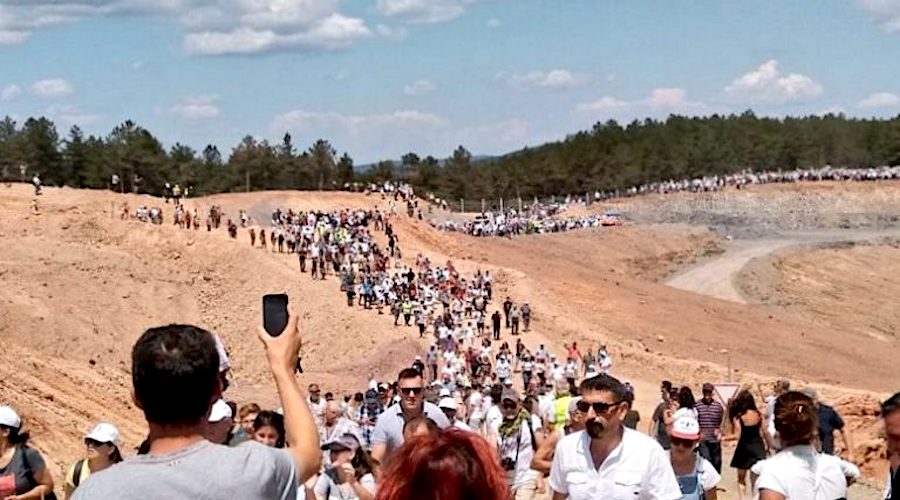Canada’s Alamos Gold (TSX, NYSE:
AGI) is facing growing opposition to its Kirazli project, located in a forested
region near Mount Ida, western Turkey, after complaints of massive
deforestation allegedly caused by the company and its planned use of cyanide
flooded Turkish social media early this month.
More than 5,000 people, including opposition lawmakers, staged a peaceful protest on August 6, on news that Alamos Gold’s local subsidiary, Dogu Biga Mining, had cut down 197,000 trees for the site, almost four times the number of trees allowed by the government.
Both Turkish officials and the company dispute the figure, adding that the Canadian miner has paid for future reforestation of the site in advance.
Recently published images obtained with the help of drones and satellites show what it is supposed to be evidence of massive deforestation around Kirazli mine site.
The country’s authorities had
allowed the clear-cut of roughly 45,000 trees, but reduced that number
considerably after consulting a July study. The Turkish Foundation for
Combating Soil Erosion (TEMA), however, recently published images obtained with
the help of satellite showing what it is supposed to be evidence of massive
deforestation around the mine site.
“As part of the forestry permit, we have paid about $5 million [and] a big component of that fee is to pay for reforestation,” Alamos’ chief executive, John McCluskey, said earlier this month.
He noted that only government
authorities were allowed to cut trees, not companies.
Activists say the clear-cutting
threatens the region’s plant and animal species, some of which are only found
in Mount Ida, or the Kaz Mountains, as the area is known locally. They
also object to the company’s planned use of cyanide at the site, warning that a
leak would have devastating environmental impact on area and contaminate local
fresh water supplies.
The company says that while cyanide will be used on site, it will only be added in the final step of the extraction process, adding that it has taken measures to ensure there would be no impact in the area.

Ali Furkan Oğuz, a Turkish lawyer specializing in environmental cases, told Canada’s The Globe and Mail paper that Turkey’s system of environmental impact reports was not up to global standards. “Companies give money to consultancy agencies and ask them to prepare a report, and afterwards the government approves it,” he said.
When built, the Kirazli gold mine
is expected to produce an average of 104,000 ounces at all-in sustaining costs
of $373 per ounce over a five-year mine life.
In addition to the mine in Kirazli,
the Toronto-based miner has two more gold and silver mining projects under
development in nearby Agi Dagi and Camyurt. It also runs operating mines
in Canada (Young-Davidson and Island Gold in northern Ontario), and in Mexico
(Mulatos and El Chanate, both in Sonora state).
Turkey has a storied history of environmentalist protest, with green activists being a key element in the 2013 protests against the construction of Gezi Park that swept the country and prompted a violent security crackdown.
